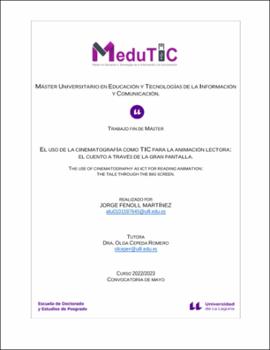El uso de la cinematografía como TIC para la animación lectora: el cuento a través de la gran pantalla.
Author
Fenoll Martínez, JorgeDate
2023Abstract
UMEN Y PALABRAS CLAVE
En los últimos años, las Tecnologías de la Información y la Comunicación y su vinculación
con las artes cinematográficas han experimentado una gran demanda en la comunidad educativa.
Estos nuevos modelos basados en métodos constructivistas servirán de base para configurar un
hábito lector a través de los largometrajes cuentísticos. Así, se enriquece la animación del alumnado
en la sociedad heterogénea del siglo XXI. El objetivo primordial de este trabajo fue identificar si
con el uso de la cinematografía cuentística en el aula se consigue en el alumnado de 1º de Educación
Secundaria Obligatoria un hábito lector. Además, de conocer el grado de motivación que aporta el
cine y el cuento en los discentes.
Con este fin, se realizó un estudio mixto con una metodología cualitativa y cuantitativa,
concretamente, al estudiantado de un Instituto de Enseñanza Secundaria de la Región de Murcia,
enmarcado en el área de Lengua Castellana y Literatura. Se llevó a cabo un estudio de caso con los
instrumentos: observación participante y entrevistas semiestructuraras y un estudio descriptivo con
cuestionarios de opinión. Los resultados han constatado que las técnicas del cine y el cuento en el
aula han permitido incrementar la motivación del alumnado y su participación en el aula muy
positivamente. También, los alumnos y alumnas han aumentado la formación de su hábito lector a
través del gusto por la lectura y se han experimentado mejoras en su rendimiento académico,
concretamente, en el vocabulario y la ortografía. Finalmente: los discentes obtuvieron unas
profundas reflexiones sobre lo que la cinematografía cuentística les aporta en su día a día para
formarse como ciudadanos In recent years, Information and Communication Technologies and their link with the
cinematographic arts have experienced great demand in the educational community. These new
models based on constructivist methods will serve as the basis for setting up a reading habit through
feature tales films. Thus, the animation of students in the heterogeneous society of the 21st century
is enriched. The main objective of this work was to identify if the use of storytelling
cinematography in the classroom achieves a reading habit in the students of 1st year of Compulsory
Secondary Education. In addition, to knowing the degree of motivation that movies and stories
bring to students.
To this end, a mixed study was carried out with a qualitative and quantitative methodology,
specifically, to the student body of a Secondary Education Institute of the Region of Murcia, framed
in the area of Spanish Language and Literature. A case study was carried out with the instruments:
participant observation and semi-structured interviews and a descriptive study with opinion
questionnaires. The results have confirmed that film and storytelling techniques in the classroom
have made it possible to increase the motivation of students and their participation in the classroom
very positively. Also, the students have increased the formation of their reading habit through the
taste for reading and improvements have been experienced in their academic performance,
specifically, in vocabulary and spelling. Finally: the students obtained some deep reflections on
what short story cinematography brings them in their day to day to train as citizens.





